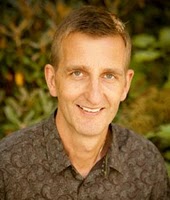 I’m delighted top have Dr. Friedemann Schaub back as my guest today. In March he shared The 9 Keys to Self-Healing. He works with people to help them improve their health using both inner tools and his medical background. I’m a big proponent of keeping your mind clear of negatives and using it to attract positive stuff, including good health. We know what’s on our conscious mind but it’s the subconscious one that usually sabotages us. Dr. Schuab explains the importance of keeping yours as free of negatives as you can and how it affects your health, positively or negatively.
I’m delighted top have Dr. Friedemann Schaub back as my guest today. In March he shared The 9 Keys to Self-Healing. He works with people to help them improve their health using both inner tools and his medical background. I’m a big proponent of keeping your mind clear of negatives and using it to attract positive stuff, including good health. We know what’s on our conscious mind but it’s the subconscious one that usually sabotages us. Dr. Schuab explains the importance of keeping yours as free of negatives as you can and how it affects your health, positively or negatively.
by Dr. Friedemann Schaub
What is the difference between the conscious and subconscious / unconscious mind? And why is working with the subconscious mind so effective?
An iceberg is a great analogy that describes the connection between the conscious and the subconscious mind- with a small, visible part above the surface and a huge part below. The conscious mind is responsible for our awareness in the waking state. Thinking analytically, creating logical order, wondering about cause and effect and asking “why” are all characteristics of the conscious mind. The conscious mind is the place of cognitive learning and understanding and uses the intellect to come up with logical solutions for problems. It makes choices based on facts and moves the body deliberately.
The subconscious is the part of our mind, which operates usually below the level of our normal consciousness. Like in the iceberg analogy, the subconscious mind is the vaster and more substantial part of our mind, and has, compared to the conscious mind, a much wider variety of tasks and responsibilities.
While consciously we can only compute a small fraction of the vast amount of information that approaches us at any given time, our subconscious mind is able to compute much more. We are able to stay aware of our surroundings, pick up subtle cues from others and notice small external and internal changes without our conscious awareness. Have you ever felt that someone is looking at you, and then turned around to find out who it was? Or you met a friend and right from the first moment you sensed that something was not “right?” You may be a person who respects the importance of the “first impression”, the “gut reaction”, “chemistry” or “intuition”. All these examples are not based on rational considerations but stem from the input of your subconscious.
The subconscious creates our emotions, often independently of the input of the conscious mind. This explains why emotions can appear so irrational and “inappropriate” – why we can wake-up in the morning grumpy or anxious and find ourselves completely happy and optimistic at lunchtime, without that “logically” anything had really changed.
One of the major tasks of the subconscious is to help us define ourselves and make sense of the world. It uses emotions, memories, core values and beliefs as “filters” to sift through the otherwise overwhelming amount of information we are exposed to and condense it to a size that is consciously comprehendible. In other words, whatever we perceive as “reality” is largely determined by our subconscious filter.
In addition, the subconscious oversees all physiological functions of the body; we don’t regulate our heart rate, breathing, kidney function or digestion with our conscious mind. If we would, the collection of trillions of cells that comprise our body, wouldn’t work together as effectively and harmoniously as it usually does. Even deliberate movement, such as walking, requires the precise coordination of many different muscles, a challenge that we would not able to master consciously.
Along those lines, have you ever noticed that you can’t really recall, how you drove yourself to work or how you were eating that sandwich, while watching TV? The subconscious mind takes control of all these automatic movements and patterns, without our conscious awareness. When you consider, how much more time you spend thinking about the future or the past without paying attention to the present moment, and you are still able to avoid accidents and get things done, you can appreciate the amazing abilities and potential of your subconscious mind. In fact, studies suggest that more than 75% of our daily activities are regulated by the subconscious mind.
Considering its vast responsibilities, it makes sense that the root causes of many emotional and physical problems reside in the subconscious mind. For example, unexpressed and unresolved memories and emotions that are stored within the subconscious mind can function as negative, limiting filters and lead to chronic anxiety, phobias, depression, addictions and low-self-esteem. Limiting core beliefs, such as “I am not good enough” or “I am not safe” are imprinted on subconscious levels and can keep us stuck and prevent us from seeing who we really are and accessing our true potential.
Once the subconscious storage capacity is exhausted, negative emotions begin to accumulate in the physical body, which can weaken our immune-system and lead to chronic pain, inflammation of the joints and auto-immune diseases.
This transference of emotions, from the subconscious mind to the body may not only be about creating additional storage room, but also function as a form of subconscious communication, letting us know, that it is time to address these unresolved emotional issues. Discomfort is a form of wake-up call.
By working consciously with the subconscious mind, through modalities such as Time Line Therapy, Neuro-linguistic programming or Clinical Hypnotherapy, we can identify and address the deeper root causes of our challenges, remove and change subconscious filters and can effectively and create profound and permanent changes on the mental, emotional and physical level.
With the right leverage we can move mountains. The enormous abilities and potential of the subconscious mind provides us with that leverage.
——–
Friedemann Schaub MD., Ph.D., the founder of Cellular Wisdom, was born in 1965 in the Black Forest, Germany. He received his medical degree from the University of Munich and pursued a career in cardiology at the Munich University Hospital. He also holds a Ph.D. in molecular biology from the University of Washington in Seattle. His research has been published and featured in some of the most prestigious national and international medical and science journals, including Nature Medicine and Circulation. Dr Schaub works with patients and clients via phone or skype all over the world. Check out the resources on his website and learn more about him!
Please leave comments under my posts so we can stay connected.

